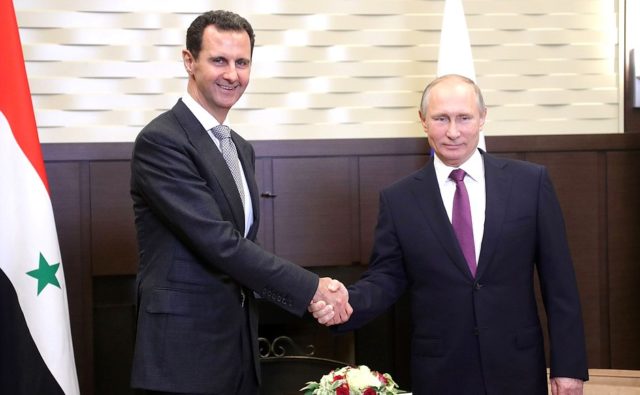
From Sochi to the Sahel: Russia’s Expanding Footprint
Publication: Eurasia Daily Monitor Volume: 14 Issue: 154
By:

Like New York City, Russian diplomacy seemingly never sleeps. Last week, President Vladimir Putin conducted a series of mini summits in Sochi on consolidating a postwar order in Syria and about taking a giant step forward in Sudan. During Putin’s first meetings on Syria, on November 20, Syrian President Bashar al-Assad showed up somewhat unexpectedly to discuss, or more likely to hear from his Russian counterpart, the outlines of a political process for the war-torn Middle Eastern state. The proposed peace deal will have al-Assad remain as president, while a congress of all Syrian factions will be called to discuss the country’s future constitution and political order (Kremlin.ru, November 20).
Two days later, on November 22, Putin met with the leaders of Turkey and Iran, Presidents Recep Tayyip Erdoğan and Hassan Rouhani, respectively. The three heads of state produced a document supporting the convocation, in Sochi, of a “National Dialogue Congress” for post-war Syria (Kremlin.ru, November 22). Although all three men emphasized they were acting in accordance with the guidelines set by the United Nations for reconstructing a viable Syrian political order, in fact Russia and Iran (with Turkey in their wake) are pursuing their own separate agenda but want to preserve the appearance of acting under UN auspices. As is generally the case, politics follows the military outcome on the battlefield, where Russia and Iran have largely prevailed.
Predictably, Russian media coverage of Putin’s diplomatic offensive in Sochi was euphoric. Not only did local media sources play up the seeming end of international demands for al-Assad’s ouster as a victory for the Kremlin, some writers opined that the Sochi meetings were akin to a new Yalta (Kommersant, November 22; Riss.ru, November 21).
On the other hand, some cooler heads pointed out that Russia, Iran and Turkey still had much hard bargaining to do and that the hatreds and mistrust that spawned and grew out of Syria’s civil war remain intact, making the attainment of peace rather harder than might be assumed (Rossiyskaya Gazeta, November 11; Kommersant, November 22). Nonetheless, no sooner did the Sochi-3 announce the Congress on a post-war Syrian settlement, its initial meeting was postponed—until February (RIA Novosti, November 27). Clearly, bringing peace and order to Syria will be much more difficult than many expect. However, a number of commentators opined that the West had been unceremoniously demoted from the Middle East and, as an anonymous Ministry of Defense source stated, “The Russian military presence in the Eastern Mediterranean is necessary for keeping the balance of power and the interests that we lost after the USSR’s [Union of Soviet Socialist Republics] disintegration 25 years ago” (Gazeta.ru, November 21).
Today, as in Soviet times, the way to ensure that Moscow has viable bases for deploying and sustaining that presence beyond Russian borders is through the provision of foreign energy and arms sales. Throughout the Middle East and Africa, this process is being carried out with unceasing vigor. At Sochi, this drive further manifested itself in Putin’s meeting with Sudanese President Omar al-Bashir, on November 23. In front of his Russian host, al-Bashir declared that he sought Moscow’s protection because the United States was threatening his government, which is quite contrary to the truth. Russian officials responded in kind: notably, Prime Minister Dmitry Medvedev spoke of increased trade and cooperation, declaring Sudan a major partner in Africa (Allafrica.com, November 25). Even more tellingly, President al-Bashir discussed with Putin the possibility of setting up a Russian naval base on the Red Sea. And in response, the first deputy chairman of the defense and security committee in Russia’s Federation Council (upper chamber of parliament), Frants Klintsevich, welcomed the proposal. The Russian lawmaker said such a base could play an “exceptionally stabilizing role” and predicted that many other states might ask Russia, on the basis of its Syrian success, to establish a permanent military presence on their soil (Aawsat.com, November 26; RIA Novosti, November 25).
This issue of naval and other bases cuts to the heart of Russia’s concrete Middle Eastern and African objectives. Although Moscow says it plans to reduce its forces in Syria, it will retain its naval and air bases there. It also is seeking air or naval bases in Egypt, Cyprus, Libya, and potentially even Yemen (see EDM, July 17, 2013; October 14, 2016; February 1, 2017; and Stephen Blank, “The Foundations of Russian Policy in the Middle East,” Russia in the Middle East, The Jamestown Foundation, October 5, 2017). Clearly, Moscow aims to dominate not only the Eastern Mediterranean but also the approaches to this area, including the Suez Canal and the Red Sea. Moreover, as Russia deploys its long-range missiles to the Caucasus and the Caspian basin, it also gains new capabilities not only to interdict Western strike forces in the Eastern Mediterranean but also in the Middle East (see EDM, October 26, 2015; UAWire, March 18, 2017). And if Russia does manage to actually secure a base in Yemen and/or Sudan, it will gain leverage over the Bab-el-Mandeb Strait entering into the Red Sea, as well as entry into the Persian Gulf. The energy deals and arms sales it is making to Sudan along with other states in the Sahel and the Middle East all have as their goal the securing of such basing rights and access along with leverage over energy flows from these countries to Europe.
Moscow’s unceasing diplomacy and strategic focus contrast with the disarray of US policy and the absence in Europe of any real strategic grasp of what is now at stake in the Levant. While Moscow, like New York City, seemingly never sleeps, the West remains somnolent.



